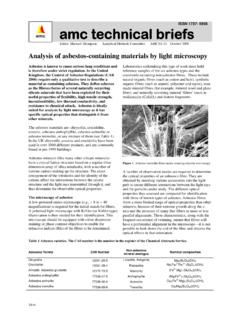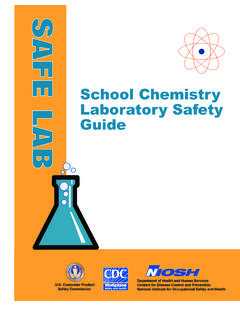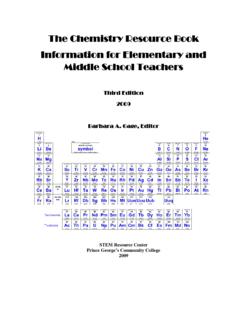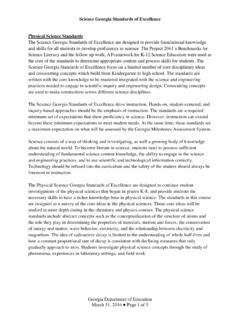Transcription of Degrees in Chemistry - Royal Society of Chemistry
1 Degrees in ChemistryFurther Studies in Chemistry and the Chemical essential degree in Chemistry opens the door to a wide range of career options far more than you may have realised. Chemists are not just confined to the lab! Chemists play a vital role in developing many of the everyday products we take for granted and help to sustain and improve our quality of of trained chemists end up in non-traditional Chemistry careers because of all the transferable skills they gain from studying Arctic Images/Alamy11 Why study Chemistry ?As a chemist you in Chemistry the essential guide2 Use forensic techniques to analyse and investigate trace evidence from the scene of a solve crimeDevelop new ways of controlling plant and animal pests, or invent novel foods and the safety of products such as medicines and cosmetics and find greener ways of making new materials for the 21st century, which can be used in anything from solar panels to waterproof feed the worldDiscover new medicines to prevent, treat and cure illness and find better ways of diagnosing fight diseaseShare your Chemistry knowledge as a teacher and help others to pursue an interest in inspire the protect our.
2 Invent new * The economic benefits of higher education qualifications. Price Waterhouse Coopers LLP January 20053 Independent research* shows that the average Chemistry graduate earns substantially more over a lifetime than graduates of many other disciplines: 190,000 more than those with two or more A-levels (no degree ) 60,000 more than most other graduates including those with Degrees in subjects like history, english and psychologyIt pays to do chemistryThe skills you develop while studying for a Chemistry qualification are highly desirable to employers in all sorts of sectors. Skills like:Whether you know what you want to do after university or you re still unsure, a Chemistry qualification stands you in good stead for the future.
3 Logical thinking Communication Creativity Analysis Data handling ObservationYour skillsStudying Chemistry is also great training for careers in: Sales and marketing Consultancy Central and local government Business and finance Law Publishing Journalism Information technology And much careersDegrees in Chemistry the essential universities now offer both BSc (Bachelor of Science) and MChem/MSci (Master of Chemistry /Science) degree programmes. MChem and MSci Degrees have exactly the same status as each other, these courses simply have different names at different Degrees Usually involve studying for three years (four in Scotland) Provide excellent training in the chemical sciences and can open doors to a huge range of careers May involve a year in industry or abroadMChem/MSci Degrees Usually involve studying for four years (five in Scotland)
4 Provide a more in-depth study of Chemistry than BSc Degrees and usually involve a significant research project Offer more opportunities to develop skills such as presentation skills, problem solving and communication skills May involve a year in industry or abroad Provide a good basis for a PhD or a career in chemical science researchDifferent types of Chemistry degreesThere is a wide variety of Chemistry degree courses on offer in the UK. These vary in content, duration and the qualification you achieve, as well as the types of career they prepare you you re not sure whether you want to do a BSc or an MChem/MSci many universities recommend that you apply for the longer course in the first instance. Transferring from an MChem/MSci to a BSc is usually relatively straightforward but it may be harder to transfer the other courses may help keep your options open if you re undecided about what to do after university (especially if you might want to do a PhD or go into research).
5 BSc or MChem/MSci?Still not sure? for case studies of Chemistry graduates working in a range of careers, with information including how they got there and what their job involves on a day-to-day basis for information on careers in science use the UCAS website to research your course and university choicesCheck universities offer degree courses that involve a period of work in industry. The experience you gain is valuable if you are hoping to enter a career in industry (it may even lead directly to a job after you finish your degree ). If you are undecided about what you want to do after university it may help you make up your mind about whether this type of career is for are usually paid by industry during their placement year.
6 Industrial placements and internships are advertised on experienceIf you re interested in studying a Chemistry or Chemistry course, it s important to consider how this might affect your future career options. Many jobs within the chemical and pharmaceutical industries will only be available to graduates who have spent a considerable amount of time in teaching laboratories developing their practical skills. Chemistry with There are lots of degree programmes in Chemistry and related subjects that involve a year at a university abroad. You could spend the year in Europe, the US or even Asia or Australia. The first two years of these courses are normally spent following the appropriate chemical science programme in a UK university and acquiring any language skills you might need while abroad.
7 You will then spend the third year studying abroad. During this year you will follow the syllabus of the host university and will be assessed before returning to the UK for your final abroadChemistry with a These courses generally involve spending 50% of your time studying Chemistry , and 50% studying another subject, Chemistry and French Chemistry and Business Chemistry and MathematicsChemistry and coursesThese courses generally involve spending at least 60% of your time studying Chemistry and the remainder studying another subject, Chemistry with Management Chemistry with Law Chemistry with Environmental ScienceChemistry with courses8 Degrees in Chemistry the essential guideSome courses allow you to specialise in a particular field of Chemistry .
8 Medicinal Chemistry Analytical Chemistry Nanotechnology Environmental ChemistryIf you are thinking about studying for a specialised Chemistry degree , you need to be certain that you are interested in the area you choose. By choosing a more specialised Chemistry degree you may be narrowing the options of what you can do after university. Research into the subject is vital, especially if you haven t studied it at school or college. If you re not 100 per cent sure about what is involved and whether you ll like it, you may want to choose a more general Chemistry degree that allows you to specialise in the final years of the course, when you have a better understanding of what is involved and which aspects you most coursesSpecialised Many degree courses include a significant amount of are collectively referred to as chemical science courses.
9 They include subjects like biochemistry, chemical engineering and pharmaceutical science. These Degrees all require a good knowledge and understanding of the chemical principles that underpin them. involving chemistryOther Degrees Do your maths skills add up?Mathematics is important in many aspects of Chemistry and is a key part of most Chemistry degree courses. Not studying maths A-level/Higher will limit your university a maths A-level/Higher is not required for entry onto all Chemistry degree courses, you should seriously consider studying the subject, at least to AS Level (or Higher in Scotland). If you are unable to do this, it may be worth considering some form of tutoring to help refresh and extend your maths knowledge. If you haven t studied maths post-16, don t panic!
10 Most universities provide extra maths support during your degree (especially in the first year). Are you interested in a Chemistry degree but worried you don t have the necessary qualifications?Some universities offer a foundation year (or access course) as part of their Chemistry course. These one-year programmes are designed for students who have shown the ability, but do not possess the necessary qualifications (with respect to either grades or subjects) for direct entry onto BSc or MChem/MSci courses. After completing the foundation year you should be eligible to progress, as appropriate, onto the university s BSc or MChem/MSci foundation year may cover a range of topics, including laboratory work, a project, mathematics and elements of other science subjects.















